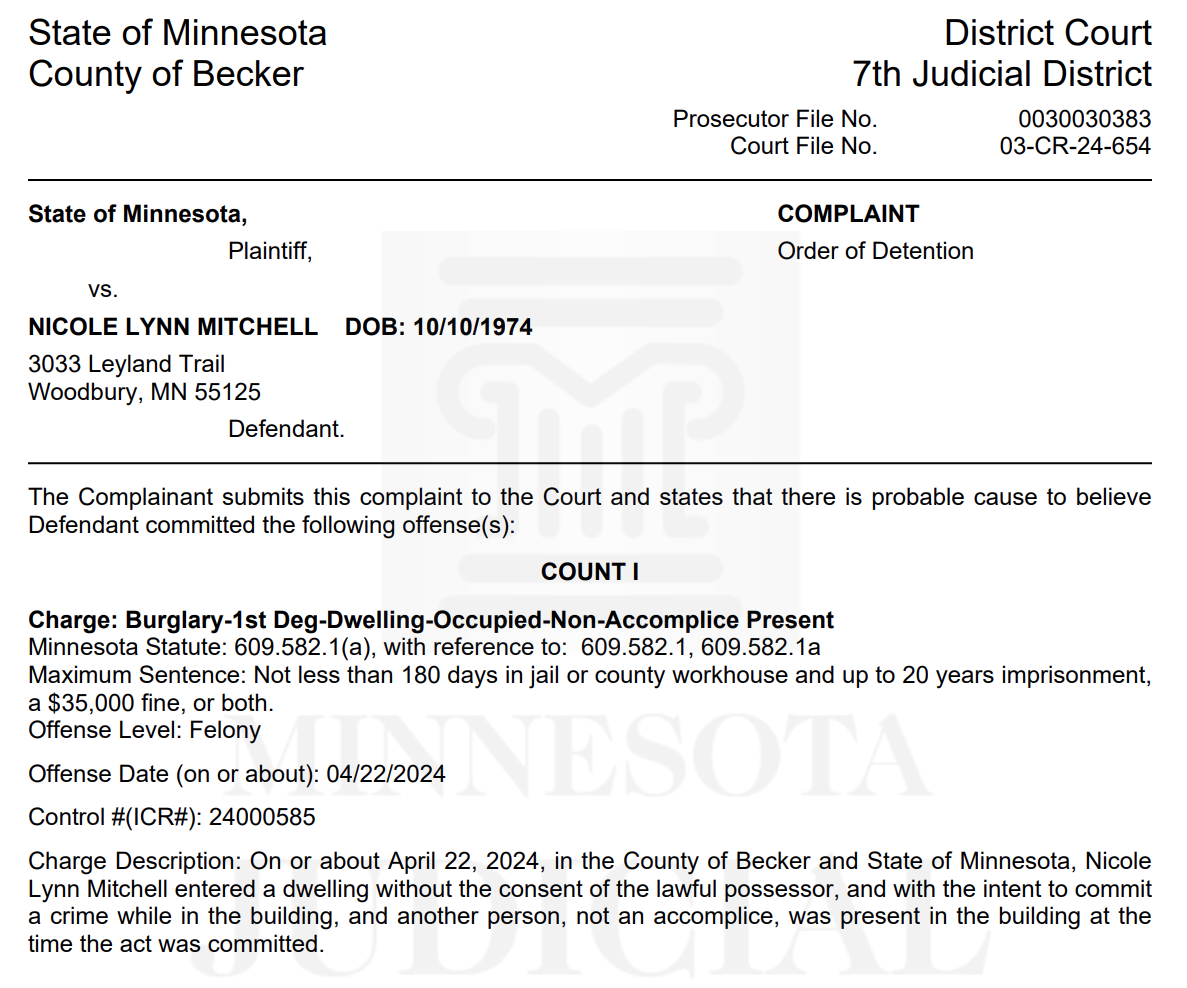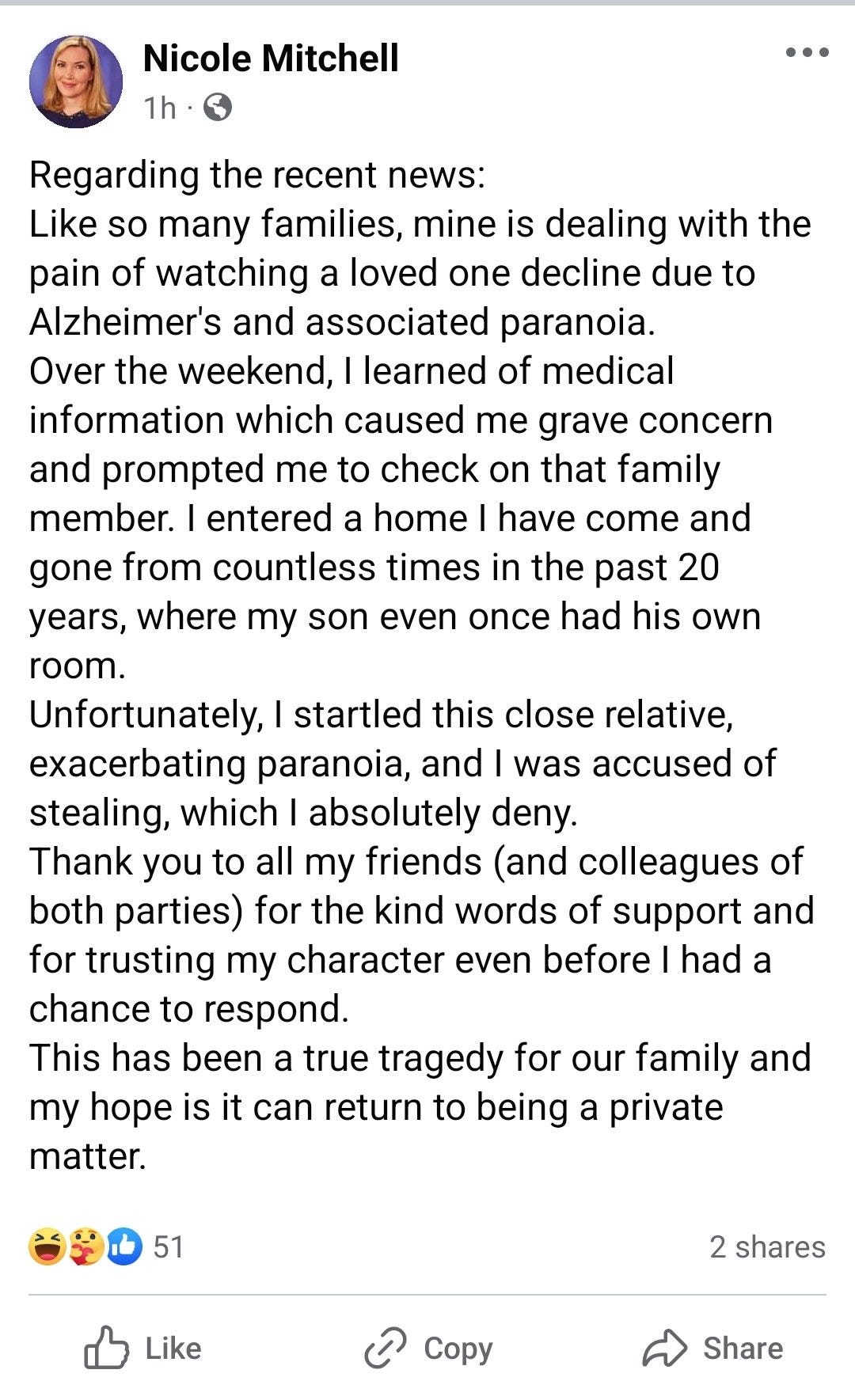Senator Mitchell's Broken Compass
Despite Admitting to Every Element of Burglary in the First Degree, Mitchell Casts the Deciding Vote to Protect Her Party's Agenda
In the wake of serious criminal allegations, Minnesota State Senator Nicole Mitchell's capability to effectively serve in the legislature has been called into question. Senator Mitchell has been charged with first-degree felony burglary, stemming from an incident where she allegedly unlawfully entered her stepmother's residence in Detroit Lakes to retrieve personal items, including her late father's ashes.
According to the official criminal complaint filed in Becker County, this offense involved the unlawful entry into a dwelling while another person was present, an action that carries a potential maximum sentence of 20 years imprisonment and a $35,000 fine under Minnesota Statute 609.582.1(a).
In her Facebook response to these allegations, Senator Nicole Mitchell presents a narrative of familial concern, specifically highlighting her stepmother's decline due to Alzheimer's and associated paranoia. Despite her intent to frame the incident sympathetically, her account inadvertently meets the elements required for a conviction of first-degree burglary under Minnesota law1:
Unauthorized Entry: The individual must enter a building without consent. Senator Mitchell admits to entering her stepmother's home without permission, which she accessed by breaking into a basement window.
Intent to Commit a Crime Inside: At the time of entry, the individual must intend to commit a crime within the building. Mitchell intended to remove items from the home without permission, theft.
Building is a Dwelling: The building entered must be a dwelling. Mitchell entered her stepmother's home, a dwelling.
Occupied at the Time of Entry: Another person, not an accomplice, must be present in the dwelling at the time of the entry. Mitchell's stepmother was inside the home when she entered.
In response to these charges, Senate Majority Leader Erin Murphy declared that Senator Mitchell would be removed from her committee assignments and barred from caucus meetings while the legal and Senate investigations are ongoing. This decision effectively sidelines her from active legislative duties, however much like benching a quarterback post-season, since the committees have concluded their sessions for the current term, this move is purely symbolic.
However, the implications of her remaining in office, especially in making critical votes on public policy, including public safety, are profound and unsettling.
This situation reached a critical point when Senator Mitchell cast the deciding vote against a GOP-led motion aimed at revoking her voting powers in the Senate. This action has sparked significant controversy, given her current charges and the potential conflict of interest in participating in decisions that shape law and order while under criminal investigation herself. Senator Scott Dibble defended her participation by asserting that each Senate district deserves representation.
Nonetheless, allowing a senator facing serious felony charges to influence public safety policy is unacceptable.
The ethical considerations surrounding Senator Mitchell's continued service are compounded by the nature of her alleged crime. Burglary, particularly of the first degree, is a severe breach of the law that fundamentally undermines public trust in an elected official's judgement and integrity. The circumstances of her arrest—captured on police body cameras, according to Detroit Lakes Police Chief Steven Todd—add a layer of irrefutable scrutiny that cannot be easily dismissed.
The Senate Ethics Committee is scheduled to convene on May 7 to delve deeper into these allegations, a meeting that could potentially reveal more unsettling details about the senator's conduct. Senator Karin Housley, a Republican from Stillwater, posed a poignant question during the debate on Mitchell's voting rights:
"Are we really going to let a member who is accused of such a serious crime, be the deciding vote on these bills passing through this body?"
Senate Democrats have been deflecting these concerns, claiming that Mitchell is entitled to "due process" and challenging the lack of a criminal conviction as a reason to stall any suspension or removal.
Due process in a criminal court and the procedural due process required for investigating ethics complaints in a legislative body are distinctly separate proceedings, each governed by their own set of rules and standards. In court, due process is a constitutional guarantee that ensures fair treatment through the normal judicial system, especially as a citizen's entitlement to a fair trial.
Conversely, procedural due process in legislative ethics investigations involves internal rules set by the legislative body to address complaints and allegations of misconduct among its members.
The ethical review of a legislator focuses on whether their actions align with the ethical standards and expectations of the legislative body, independent of criminal proceedings. However, these reviews can be influenced by political considerations, particularly when the majority's control is at stake, as seen in the case of Senator Nicole Mitchell. Her own admissions on social media, coupled with attempts to blame her stepmother's medical condition for her actions, spotlight a lack of judgment that clearly establishes she cannot objectively and effectively evaluate public policy.
Unfortunately, as the Senate DFL is running interference to protect their fragile 34-33 majority, the only thing that can restore legitimacy to the legislature is Senator Mitchell’s moral compass, which, regrettably, seems to only point towards protecting her party's agenda.
Unauthorized Entry: The individual must enter a building without consent. Senator Mitchell admits to entering her stepmother's home without permission, which she accessed by breaking into a basement window.^[Minnesota Statutes § 609.582.1(a); Minnesota Model Jury Instructions-CRIMJIG 19.15.]
Intent to Commit a Crime Inside: At the time of entry, the individual must intend to commit a crime within the building. Mitchell intended to remove items from the home without permission, constituting theft.^[Minnesota Statutes § 609.582.1(a); Minnesota Model Jury Instructions-CRIMJIG 19.17.]
Building is a Dwelling: The building entered must be a dwelling. Mitchell entered her stepmother's home, a dwelling.^[Minnesota Statutes § 609.582.1(a); Minnesota Model Jury Instructions-CRIMJIG 19.18.]
Occupied at the Time of Entry: Another person, not an accomplice, must be present in the dwelling at the time of the entry. Mitchell's stepmother was inside the home when she entered.^[Minnesota Statutes § 609.582.1(a); Minnesota Model Jury Instructions-CRIMJIG 19.19.]








I would give my world to see that body cam footage!